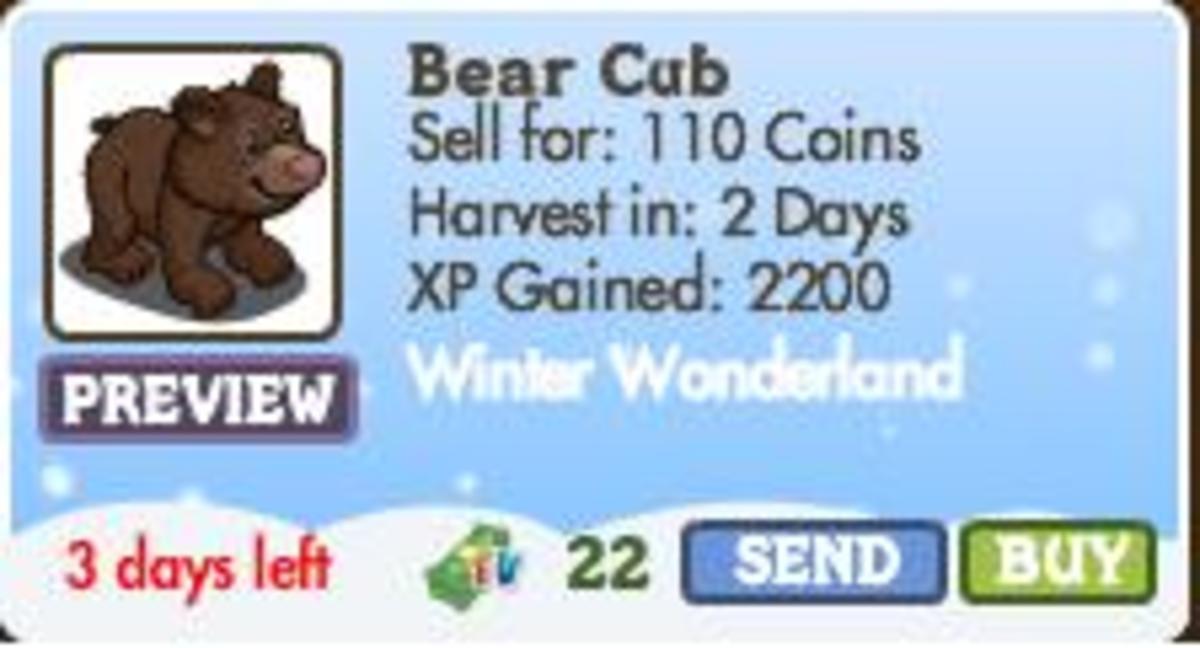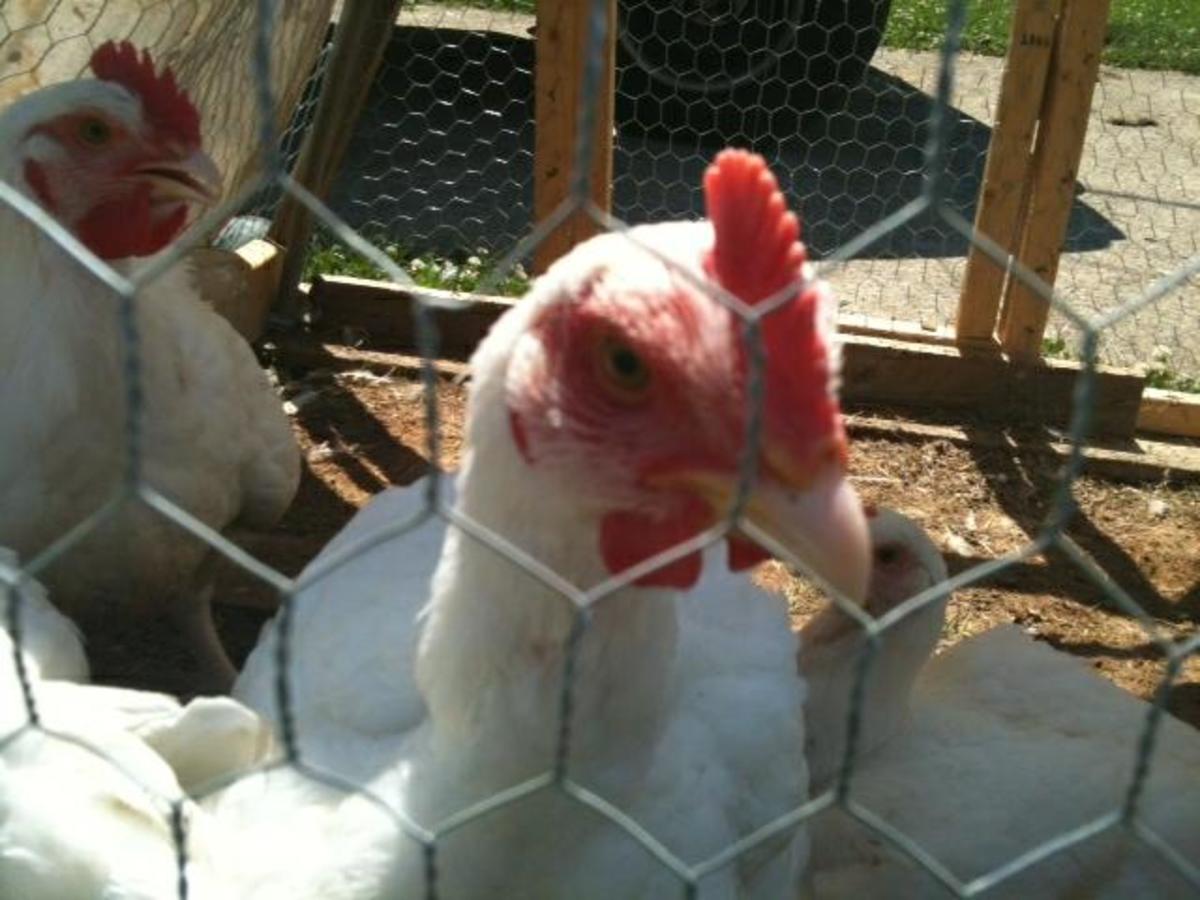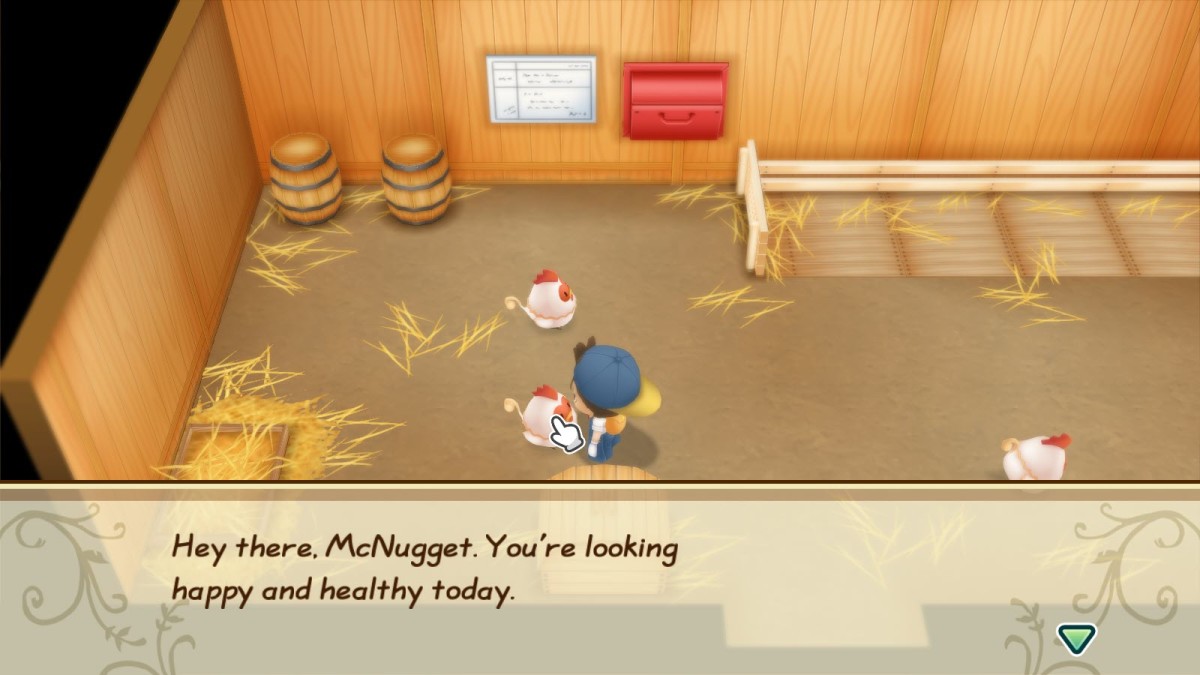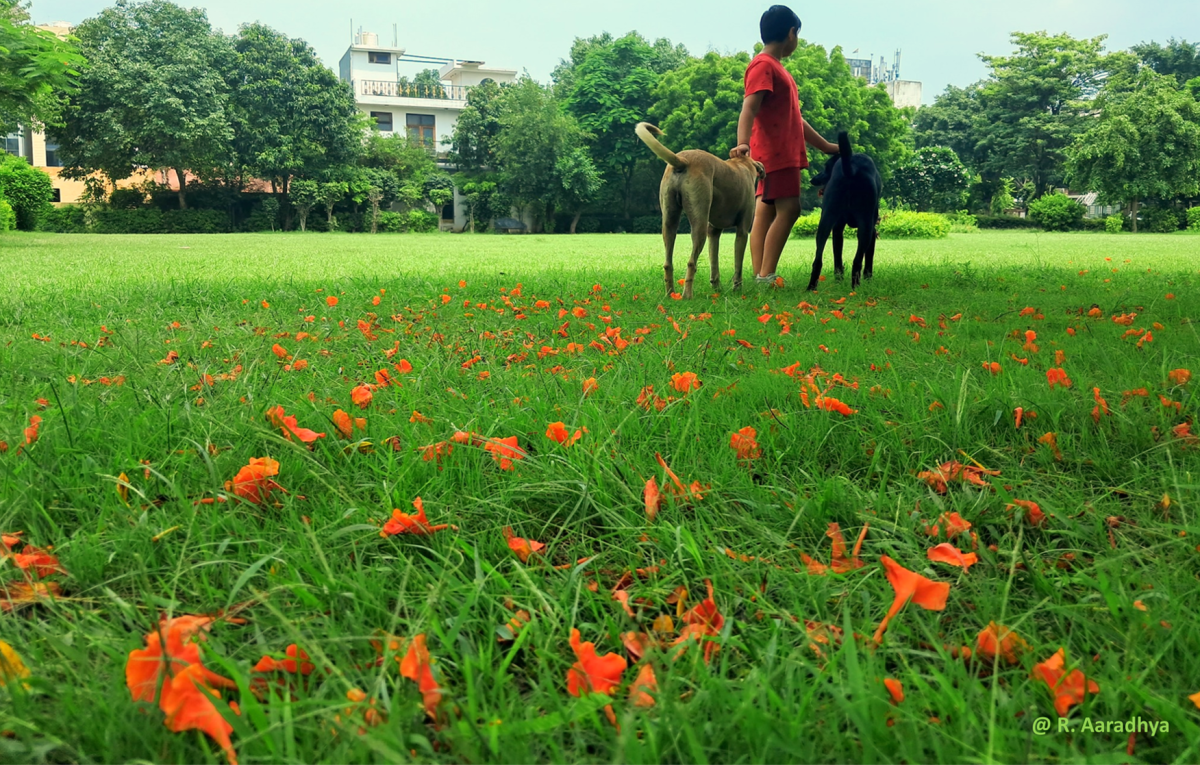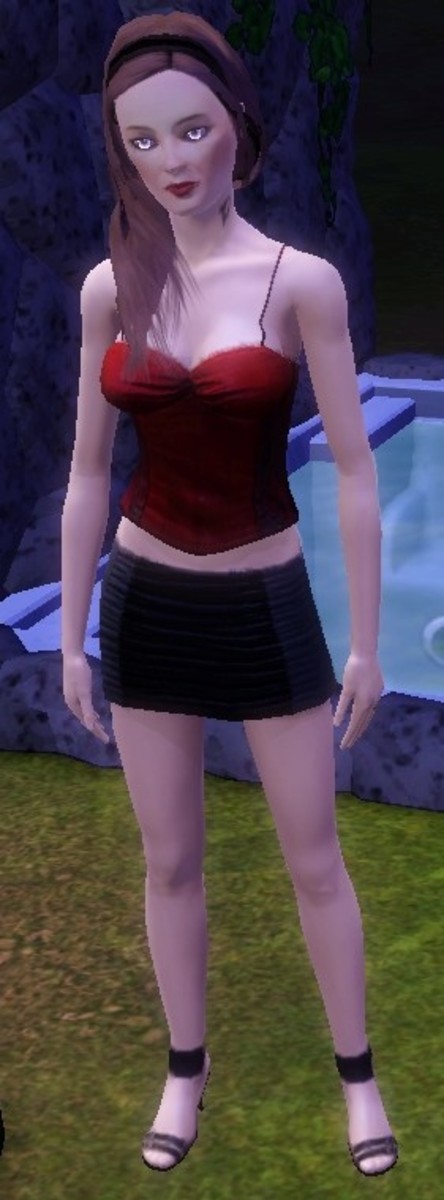Retro Game Review: Harvest Moon
Harvest Moon Title Screen
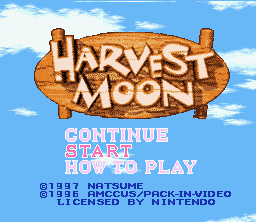
Shine on, Harvest Moon
People love farm simulators. Farmville and it's sequel, Farmville 2, are two of the most popular pay-to-play browser games available today, and have even spanned tie-in mobile apps that allow you to make items to use on your farm. These games were inspired by the SNES game Harvest Moon.
The Harvest Moon series actually split sometime in the mid 2000s. The farm simulator genre continued to be called "Harvest Moon" but a new series also came out entitled "Rune Factory: A Fantasy Harvest Moon". I adore the Rune Factory seres, but I'm not sure that I would consider them "retro" yet. Those games haven't really had time to age properly yet.
The basic premise of Harvest Moon is simple. The player character's grandfather has recently passed away, leaving his land as an inheritance. However, he had neglected the land prior to his death, and left it untilled, covered in rocks and wood stumps, riddled with vermin like gophers, and altogether in rough shape. If the player wants t0 survive, they will repair the land and work it to successfully grow crops and build their business, earning money for things like livestock and home repairs.
Work Your Fields
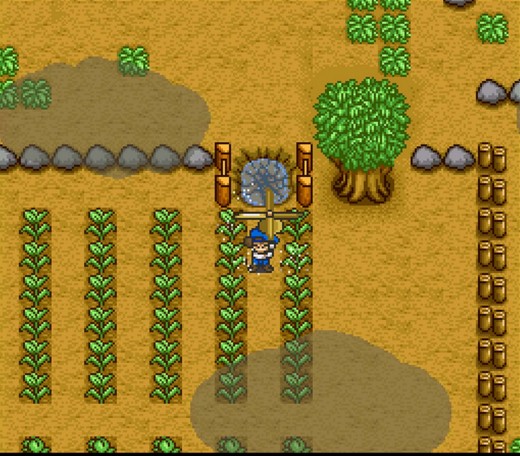
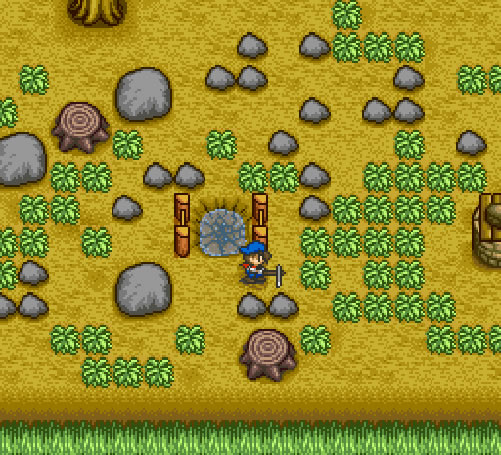
Where to Buy
Business Sense
As the first game of it's kind, Harvest Moon set the standard for simulated farming business practices. The game is divided chronologically into four different seasons, each 30 days long, and into days that begin at 6am and end at 6pm. This game is unique in the series in the sense that the days end at 6pm, but the character does not automatically go to bed. That means that the player can run around, doing field work, in a perpetual dusk, until either their stamina runs out, or they decide to go to bed.
The spring and summer seasons are for sewing crops, just like in the real world, and the autumn is for harvesting. Nothing will grow in winter, so make sure that you've harvested everything before winter 1st, or it will become a frozen weed, and you'll have completely wasted your seed money. During winter, survival is the name of the game, since you won't be able to raise crops to sell. But that's alright, because this game isn't just about crops.
Raise Livestock Animals
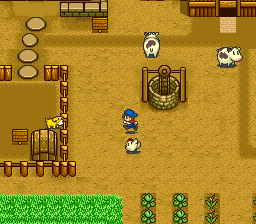
Raising Livestock
The only way that you're going to make it through the winter without starving is by raising livestock animals. Early in the game, one of the villagers will come to your farm with a dog. She found the stray, but her parents wouldn't allow her to keep it, because her house is in the back of the general store. Every farm needs a good watch dog, and if you take care of it by hugging it every day, it will keep away predators like coyotes, as well as pests like gophers.
But your dog isn't making you any money. In order to survive when you have no crops to ship, you'll have to get some producing animals. The cheapest option is a chicken, which you can buy for $100 in-game from the livestock breeder, and it will immediately begin to produce eggs. You can either sell those eggs, or incubate them. If you incubate them, after a few days they will hatch into chicks, who will grow up and start producing eggs themselves. So you can buy one chicken and then hatch your own until your coop is full. Your coop can fit 12 chickens total, and if you have 12 egg producers, you can make a comfortable profit even in the winter.
Cows are five times as expensive as chickens at $5000, but they produce milk in three different sizes, (s), (m), and (L), for ever increasing prices. In addition, the player can buy machines to churn the milk into butter or ferment it into cheese, increasing the value even more. The only downside to cows is that they won't automatically reproduce, because the livestock dealer doesn't sell bulls. This means that if you want to breed a cow, you have to go back to the livestock dealer and get a vile of semen, called "miracle potion" and impregnate the cow via artificial insemination. The cow will be pregnant for nearly a month, and then give birth to an adorable calf. Pregnant cows won't give any milk though.
In addition to the consumables that the animals produce, you can sell adult livestock back to the livestock dealer. If you've bred the animals yourself, especially the chickens because they reproduce without you having to get the miracle potion, you can make a tidy profit.
0f course, animals require constant care, so every day the player will need to feed them. All the animals, even the chickens for some reason, eat grass. So before you get any critters, you should harvest at least 9 blocks of grass to make sure they won't starve while you wait on your next grass crop to grow. In addition to the food, the cows will need to be groomed. They also like it when you talk to them, and the chickens like to be picked up. The more the animals love you, the better quality their consumables will be. If you let an animal die, you'll get a cutscene where the livestock dealer yells at you, and you'll lose your investment, so watch out.
Wedding Bells
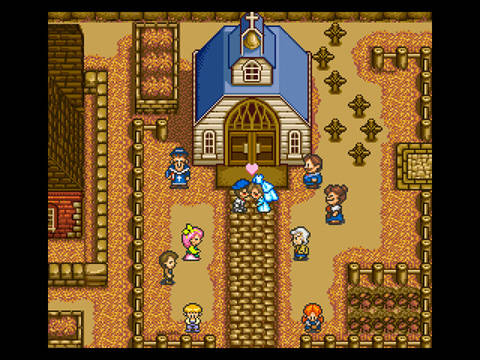
All Work and no Play Makes Jack a Dull Boy
The player isn't confined to their farm by any means. In fact, there is a mountain pass, and a village within walking distance. The mountain houses the carpenter's guild, who will help repair and extend the broken down farmhouse that the player has inherited, a fishing spot, a cave, and a rejuvenating hot-spring (which seems to be the closest the character ever gets to taking a bath).
The town is full of businesses, like the general store where you can get seeds, a restaurant where you can get food, a livestock dealer where you can get, well livestock, a tool shop where you can get farm equipment, a church where you can pray to the Harvest Goddess, and a bar where you can get trashed. Though if you're playing in the United States, for some reason Nintendo censored mentions of alcohol, so instead the characters call it juice, but the player still gets really drunk off of it so that seems arbitrary to me.
Among the townspeople are a few eligible young ladies who the player sees as potential lovers. I married Eve, a brewer who makes wines for the bar, aged in wooden barrels and clay jars. She's normally in the bar, which is open during the endless night, and therefore the easiest to talk to and woo, but there are other women who may be interested in the player.
Ellen runs the restaurant, and her uncle sells livestock, so she knows her way around the kitchen and is comfortable around animals. Her father is a rubbin' alcoholic, who is constantly so drunk he can barely stand, from the time the restaurant opens until the middle of the night. Some nights you can find Ellen in the bar begging him to stop drinking and go home to bed.
Ann is an inventor who works at the tool shop making innovative farm equipment like automatic milkers. She seems to be perpetually working on some kind of machine in the middle of the shop which, as far as I know, is never completed. She's odd in that she enjoys hurricanes, which completely destroy your fields and damage your farm, so I've never seen eye to eye with her.
Maria is a devout follower of the Harvest Goddess and is almost always seen at church. Her parents are involved in politics, and her father is the village's current mayor, but she seems to lack their charisma and social skills, preferring the quiet atmosphere of the churchyard. If you want to woo her, you better be there among the congregation every Sunday, because she'll only date a man who shares her deep religious devotion. She's big into traditional gender roles and yearns to have a husband who is a good provider so that she can have children and be sure that they'll be financially stable.
Nina is a plant lover, so she's naturally attracted to a man with a green thumb. Her sister owns the general store, and she's often seen walking beside it looking at the flowers she's planted along the building's walls. She loves receiving flowers as gifts as well. She seems t0 live t0 garden.
The village will occasionally host various festivals, during which you can go on a date with your lady, or go stag and just enjoy the festivities.
Babies
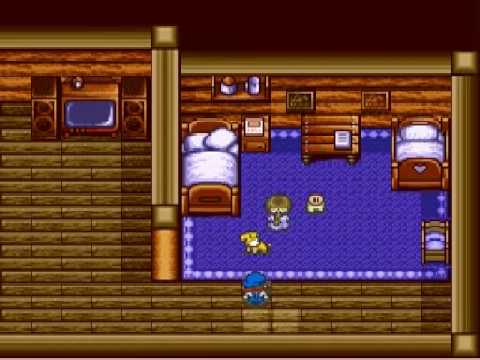
A Happy Marriage
In order to propose, the player must have a girl's affection, but also somewhere for her to live. You can't expect someone to move into the broken-down shack you inherited, so in order to convince a woman that you'll be a good husband, you'll have to have it repaired. So you'll need to get your money and wood together and head up to the carpenters in the mountain and hire them to get that done. Then, you'll need to buy the rare blue flower from the traveling salesman who comes into town every Sunday.
After you're married, your wife will move into the new house. However, in order to consummate the marriage and start a family, you'll need to expand your house so you have room for children. So it's back to raising money and chopping wood, and then back to the mountain to hire the carpenters again. After the extension, you'll have a cradle and a child's bed, so now all you have to do is keep your wife happy and come home on time.
0nce your children are born, they will grow from a baby to a child, but they will never become an adult. You can play for 50 in-game years and that kid'll still be like 5 years old. So that's weird. But it is what it is. You can have a maximum of two children.
Halfway through your third year, the ghost of your grandfather, who you will remember, willed the farm to the player will show up and judge your progress. Based on his assessment, the player will receive one of a number of endings. This game has S0 MANY endings, especially for an SNES game, giving it an amazing amount of replay values. The endings vary from the ghost haunting the player, who is alone and poor with a dog that hates him, until they're forced to flee in shame, t0 the player basking in the love of his family surrounded by his animals and crops, with his giant house, and everything in between. Even in the good endings, the particular kind of basking will vary depending on the personality of your wife. You can play this game 20 times and get a different ending every time.
Final Assessment
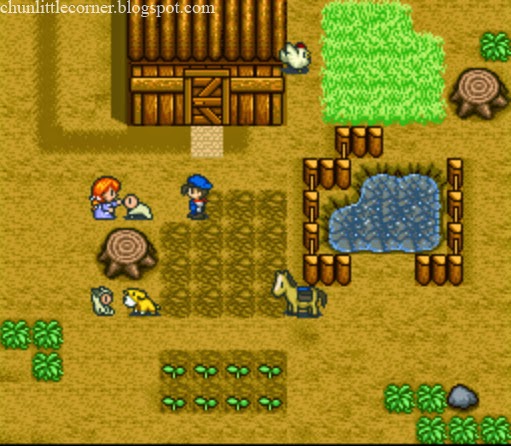
Where to Buy
Final Assessment
Harvest Moon is certainly not without it's problems. The days are like 2 minutes long, which really limits what you're able to accomplish. In later games, days are about 30 minutes long so I was unprepared for just how much I would have to rush around to get things accomplished. This problem is compounded because the player doesn't have a rucksack for items like they do in later Harvest Moon titles, so not only do you only have 2 minutes to harvest your field, you have to do it one crop at a time. This is lessened somewhat because time freezes when inside a barn and at 6pm every night, but you have to have everything in the shipping bin by 5pm because you can't leave things in there overnight.
Despite these flaws, Harvest Moon holds up well to be as old as it is, and it birthed a franchise and a genre beloved the world over. It's certainly worth a playthrough.



